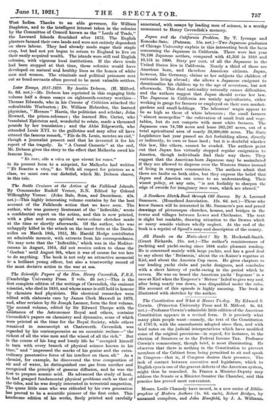The Scientific Papers of the Hon. Henry Cavendish, F.R.S. (Cambridge
University Press. 2 vols. £6 net.)—This is the first complete edition of the writings of Cavendish, the eminent scientist, who died in 1810, and whose name is still held in honour by chemists had physicists. His electrical researches were edited with elaborate care by James Clerk Maxwell in 1879, and, after revision by Sir Joseph Larmor, form the first volume. The second volume, edited by Sir Edward Thorpe with the assistance of the Astronomer Royal and others, contains Cavendish's papers on chemistry and dynamics, some of which were printed at the time for the Royal Society, while others remained in manuscript at Chatsworth. Cavendish was regarded by his contemporaries as an eccentric recluse—" the richest of all the wise men and the wisest of all the rich." But in the course of his long and lonely life he " occupied himself in turn with every branch of physical science known in his time," and " impressed the marks of his genius and the extra- ordinary penetrative force of his intellect on them all." As a chemist, for example, he discovered the true composition of air and of water, he distinguished one gas from another and recognized the principle of gaseous diffusion, and he was the first to prepare arsenic acid. He advanced the study of heat, he had grasped fundamental physical problems such as that of the tides, and he was deeply interested in terrestrial magnetism. The queer little man who was ridiculed by his own generation has proved to be a scientific pioneer of the first order. This handsome edition of his works, finely printed and carefully
annotated, with essays by leading men of science, is a worthy monument to Henry Cavendish's memory.


































 Previous page
Previous page